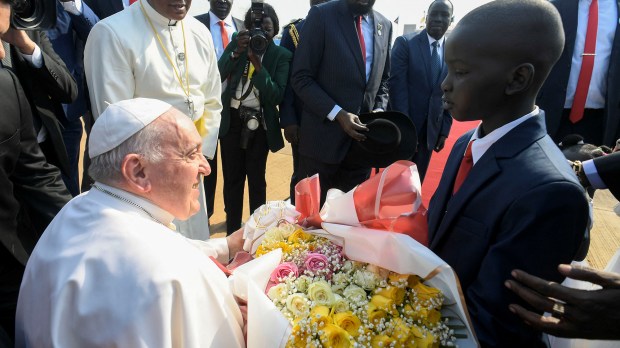Bishop Robert Barron asked every Catholic to invite someone to Mass this year. It is time to stop feeling resigned to the Church’s demise and start building the Church, he said in his YouTube video “4 Ways to Grow the Church.”
To help in that effort, I have been providing reasons we can have hope in — and be proud of — the Catholic Church in the 21st century. Today, I want to share the Church’s witnesses to faith, hope and love, because without the Church’s work in the 20th century, the world would be a very different and far harsher place in the 21st century.
First: Our witnesses to faith are providing the answers the world needs.
It is no coincidence that, simultaneous with the rise in public disbelief in God, Bishop Robert Barron’s Word on Fire ministry, Father Michael Schmitz’s Bible in a Year and Catechism in a Year, and a constellation of Catholic formation apostolates are preparing us to give answers.
God raises up the help we need for the times we are in. We had one Fulton Sheen in the 20th century. Now we have dozens: Jennifer Fulwiler or Matt Fradd if you want humor; Father Robert Spitzer or the Thomistic Institute if you are of a scientific bent; Scott Hahn and St. Paul’s Center for Scripture; Catholic Vote and Edify! for current issues, and the Augustine Institute, Ascension, Catholic Answers and more for apologetics.
And of course, Aleteia is here for all of the above.
Just in time to meet the world’s demand for answers, God’s providence arranged for some of history’s most compelling, articulate, and digestible answers to the hard questions to be delivered daily to your inbox, suited to your particular taste.
What does it mean that America’s leading podcasts are a priest reading the Bible and the Catechism? It means big changes will follow.
Second: By promoting peace and human rights, the Church provides the witnesses to hope the world needs.
Christians were in the forefront of efforts to end American slavery in the 19th century, then followed that up with the Civil Rights movement in the 20th century, whose icon is the Rev. Martin Luther King. The key early suffragettes were Christians, too: America’s women’s rights movement began in prayer meetings, often hand-in-hand with the temperance movement. Though some Christians opposed them, Christian convictions ultimately tilted both movements to the winning side.
The Catholic Church was involved in establishing international human rights standards in the 20th century. Following the work of Pope Leo XIII, Catholics championed the rights of workers and established fair wages practices in America that prevail to this day. Catholic thinking on just war and how victims should be treated shaped the Geneva Conventions, which “pope of peace” Benedict XV promoted and popes ever since have championed. Catholic theology courtesy of Thomist Jacques Maritain later shaped 1948’s U.N. Declaration of Human Rights
I love what Jody Bottum said at The Weekly Standard: Margaret Thatcher, Ronald Reagan and Mikhail Gorbachev ultimately deserve less credit for the end of Soviet communism than three shepherd children in Fatima who mobilized Catholics worldwide to reject atheistic Soviet communism and pray daily for its downfall.
In the decades that followed, St. John Paul II was an untiring antiwar voice as conflicts flared up in the Middle East and elsewhere, saying, “As long as I have breath within me I shall cry out Peace in the name of God!” Pope Francis took up the cry from his deeply moving vigil for peace in 2013 to his calls for peace in the Ukraine and around the world.
Third: The Catholic Church provides the witnesses to love the world needs.
Mother Teresa became an icon of Christian service to the poor in the 20th century. Bishop Barron said that if he could take people with questions about the faith anywhere in the world, “I would take them to Kolkata, and show them Mother Teresa’s nuns working … I’d bring them there and say, ‘Look, I’m not going to tell you what to think or how to behave. Just look at them. Just watch them for a while.’ In itself, that would probably be enough.”
But Mother Teresa is the icon of larger reality: The Catholic Church is hailed as the world’s biggest charitable organization. I love repeating what Nikki Haley, the Methodist former Governor of South Carolina and former U.S. ambassador to the United Nations, said in 2018:
“I’ve been to some truly dark places where the suffering would be hard for most Americans to imagine,” she said. On the border between Colombia and Venezuela people walk three hours each way for a meal. ”Who’s giving that meal? The Catholic Church.” At refugee camps in Central Africa boys are kidnapped into the military and girls are kidnapped into human trafficking “Who was in the forefront of changing this culture of corruption and violence? The Catholic Church.”
The Church does “everyday miracles,” she said, “helping millions of desperate people.”
Don’t think of the Church as a dying organization. Think of it as the world’s future.
The Church is bringing faith, hope, and love to millions — and Jesus needs each of us to join the effort.

